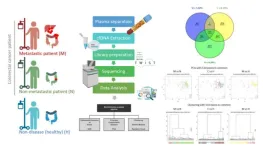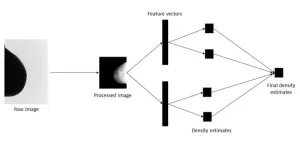(Press-News.org) **Note: the release below is a special early release from the European Congress of Clinical Microbiology & Infectious Diseases (ECCMID 2023, Copenhagen, 15-18 April). Please credit the conference if you use this story**
Embargo: 2301H UK time Friday 7 April
New research being presented at this year’s European Congress of Clinical Microbiology & Infectious Diseases (ECCMID) in Copenhagen, Denmark, (15-18 April) has identified several gold-based compounds with the potential to treat multidrug-resistant “superbugs”.
With all 19 compounds tested effective against at least one hard-to-treat bacterium and some effective against several, the Spanish researchers say that the gold-based drugs hold great potential as new antibiotics.
Drug-resistant infections kill an estimated 700,000 people a year globally and, with the figure projected to rise to 10 million by 2050 if no action is taken, the World Health Organisation (WHO) classes antibiotic resistance as one of the greatest public health threats facing humanity.
However, the development of new antibiotics has stalled and the few new antibiotics that are developed are mainly derivatives of existing treatments.
Gold is known to have antibacterial properties, making gold metalloantibiotics – compounds with a gold ion at their core – an exciting potential new approach.
To find out more, Dr Sara M. Soto González, of the Barcelona Institute for Global Health, Barcelona, Spain, and colleagues studied the activity of 19 gold complexes against a range of multidrug-resistant bacteria isolated from patients.
The complexes all belong to the same family but have slightly different structures.
The six bacteria studied were: Methicillin-resistant Staphylococcus aureus (MRSA, which causes skin and other infections), Staphylococcus epidermidis (which can cause catheter-associated infections), Pseudomonas aeruginosa (which causes infections including pneumonia), Stenotrophomonas maltophilia (pneumonia and other infections), Acinetobacter baumannii (blood and urinary tract infections and pneumonia) and Escherichia coli (blood and urinary tract infections and pneumonia).
All of the strains studied were multidrug-resistant. Four (S. aureus, P. aeruginosa, A. baumannii and E. coli) are on the World Health Organisation’s list of antibiotic resistant ‘priority pathogens’1 – meaning they are among the bacteria judged to pose the greatest risk to human health. Multidrug-resistant S. maltophilia is increasingly being found in the lungs of people with cystic fibrosis.
In tests, 16/19 (84%) of the gold complexes were highly effective against MRSA and S. epidermis.
Another 16 of the complexes were effective against the other bacteria, all of which are gram negative. Gram negative bacteria have greater inbuilt resistance to antibiotics and the need for new treatments is particularly pressing.
Gold complexes use a variety of techniques to kill bacteria. They stop enzymes from working, disrupt the function of the bacterial membrane and damage DNA. Crucially, this multimodal mechanism should prevent antimicrobial resistance from developing.
Dr Soto González concludes: “All of the gold compounds were effective against at least one of the bacterial species studied and some displayed potent activity against several multidrug-resistant bacteria.
“It is particularly exciting to see that some of the gold complexes were effective against MRSA and multidrug-resistant A. baumannii, as there are two biggest causes of hospital-acquired infections.
“The type of gold complexes we studied, known as gold (III) complexes, are relatively straightforward and inexpensive to make. They can also be easily modified and so provide a vast amount of scope for drug development.
“With research on other types of gold metalloantibiotics also providing promising results, the future is bright for gold-based antibiotics.”
Dr Sara M. Soto González, Barcelona Institute for Global Health, Barcelona, Spain. M) +34 6555 11177 E) sara.soto@isglobal.org
Please note that Dr Soto González is travelling until April 14. For urgent enquiries during that time, please contact co-author Raquel Soengas
Professor Raquel Soengas, University of Oviedo, Oviedo Spain. M):+34 6040 07552 E) rsoengas@uniovi.es
Alternative contact: Tony Kirby in the ECCMID Media Centre. T) +44 7834 385827 E) tony@tonykirby.com
Notes to editors:
References:
1. https://www.who.int/news/item/27-02-2017-who-publishes-list-of-bacteria-for-which-new-antibiotics-are-urgently-needed
The authors declare no conflicts of interest.
This press release is based on abstract 1079 at the European Congress of Clinical Microbiology & Infectious Diseases (ECCMID) annual meeting. The material has been peer reviewed by the congress selection committee. There is no full paper available at this stage.
END
Future is bright for gold-based antibiotics
2023-04-08
ELSE PRESS RELEASES FROM THIS DATE:
How to see the invisible: Using the dark matter distribution to test our cosmological model
2023-04-07
It feels like a classical paradox: How do you see the invisible? But for modern astronomers, it is a very real challenge: How do you measure dark matter, which by definition emits no light?
The answer: You see how it impacts things that you can see. In the case of dark matter, astronomers watch how light from distant galaxies bends around it.
An international team of astrophysicists and cosmologists have spent the past year teasing out the secrets of this elusive material, using sophisticated computer simulations and the observations from the one of the most powerful astronomical cameras in the world, the Hyper Suprime-Cam (HSC). The team is led by astronomers from Princeton ...
Four different autism subtypes identified in brain study
2023-04-07
People with autism spectrum disorder can be classified into four distinct subtypes based on their brain activity and behavior, according to a study from Weill Cornell Medicine investigators.
The study, published March 9 in Nature Neuroscience, leveraged machine learning to analyze newly available neuroimaging data from 299 people with autism and 907 neurotypical people. They found patterns of brain connections linked with behavioral traits in people with autism, such as verbal ability, social affect, and repetitive or stereotypic behaviors. They confirmed that the four autism subgroups could also be replicated in a separate dataset ...
New method of clustering colorectal cancer patients using DPE sequencing
2023-04-07
“[...] DPE analysis may have an important role in improving the diagnosis and management of CRC.”
BUFFALO, NY- April 7, 2023 – A new editorial paper was published in Oncoscience (Volume 10) on March 23, 2023, entitled, “New method of clustering colorectal cancer patients using differential presence of exons (DPE) sequencing.”
Colorectal cancer (CRC) is a heterogeneous disease that occurs in the colon and the rectum, parts of the gastrointestinal system. CRC is the third leading cause of cancer-related ...
Deep learning model estimates cancer risk from breast density
2023-04-07
Breast cancer is the most common cancer to affect women worldwide. According to the American Cancer Society, about 1 in 8 women in the United States will develop breast cancer in their lifetime. While it is not possible to entirely prevent breast cancer, various medical organizations advise regular screening to detect and treat cases at the early stage. The breast density, defined as the proportion of fibro-glandular tissue within the breast, is often used to assess the risk of developing breast cancer. While various methods are available to estimate this measure, studies have shown that subjective assessments conducted by radiologists based on visual analogue scales ...
COVID-19 pandemic increased the frequency of intimate partner violence
2023-04-07
Lesbian, gay, bisexual, transgender and queer people who experienced intimate partner violence in their current relationship before COVID-19 had an increase in the frequency of victimization after the pandemic began, according to a Rutgers study.
While national emergencies, crises and pandemics increase the frequency of health risks and intimate partner violence few studies have considered the nuances of social and psychological factors, such as socioeconomic characteristics and mental health, in explaining the increase in intimate partner violence during times of crisis.
“To date, most programs on intimate ...
Scientists discover a way Earth’s atmosphere cleans itself
2023-04-07
Irvine, Calif., April 7, 2023 — Human activities emit many kinds of pollutants into the air, and without a molecule called hydroxide (OH), many of these pollutants would keep aggregating in the atmosphere.
How OH itself forms in the atmosphere was viewed as a complete story, but in new research published in Proceedings of the National Academy of Sciences, a research team that includes Sergey Nizkorodov, a University of California, Irvine professor of chemistry, report that a strong electric field that exists at the surface between airborne water droplets and ...
Webb reveals never-before-seen details in Cassiopeia A
2023-04-07
The explosion of a star is a dramatic event, but the remains the star leaves behind can be even more dramatic. A new mid-infrared image from NASA’s James Webb Space Telescope provides one stunning example. It shows the supernova remnant Cassiopeia A (Cas A), created by a stellar explosion seen from Earth 340 years ago. Cas A is the youngest known remnant from an exploding, massive star in our galaxy, which makes it a unique opportunity to learn more about how such supernovae occur.
“Cas ...
A new quantum approach to solve electronic structures of complex materials
2023-04-07
If you know the atoms that compose a particular molecule or solid material, the interactions between those atoms can be determined computationally, by solving quantum mechanical equations — at least, if the molecule is small and simple. However, solving these equations, critical for fields from materials engineering to drug design, requires a prohibitively long computational time for complex molecules and materials.
Now, researchers at the U.S. Department of Energy’s (DOE) Argonne National Laboratory and the University of Chicago’s ...
The social framework
2023-04-07
On January 6, 2021, the public watched in disbelief as the Capitol building was stormed by hundreds of protestors. Most spectators at home didn't know violence at the Capitol building was already circulating through far-right social media channels for months.
Social media, for better or worse, play a large role in how we consume information – as well as spreading misinformation and conspiratorial propaganda.
Researchers at the University of Pittsburgh received $100,000 as part of the Meta Foundational Integrity Research ...
HonorHealth Research Institute joins City of Hope and TGen in creating method for scoring pancreatic cancer patients for surgery
2023-04-07
SCOTTSDALE, Ariz. — April 7, 2023 — A trio of premier Southwest biomedical research centers — HonorHealth Research Institute, City of Hope and the Translational Genomics Research Institute (TGen), part of City of Hope — have developed a more precise method that may help determine when it is best to surgically remove of pancreatic cancer tumors.
Surgical removal of the tumor can be a key step in helping extend the survival of patients with pancreatic cancer, one of the most aggressive and deadly of all malignancies and the nation’s third leading cause of cancer-related death. Currently, surgery — or surgery plus chemotherapy ...




